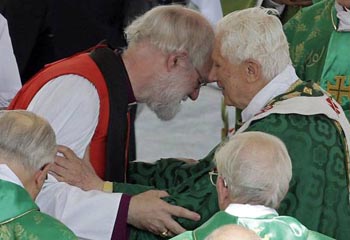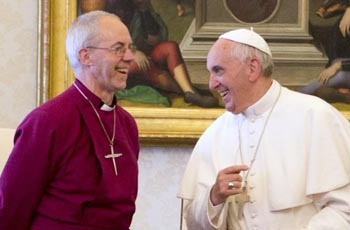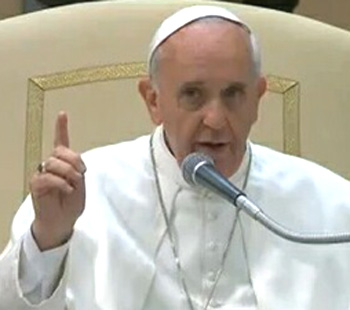Traditionalist Issues
 |
 |
 |
 |
 |
 |
 |
The Frog and the Ox
A delusional article appeared in the June 13 issue of New Oxford Review about Pope Francis. Entering the choir of optimistic traditionalists and conservatives who are afraid to face reality, the anonymous commentator of that magazine presented a complacent view of him omitting his many errors.
Taking the politically correct route (strange for a magazine that denounces political correctness) the editorial does not criticize the Pope for his revolutionary novelties - like washing the feet of two women on Holy Thursday - but rather accuses “the right” that has severely criticized those egalitarian innovations.

 One inane statement - intended to be positive - was that "the new Pope is continuing in the path of his predecessor." (1) Of course this is true, but portends only woe for the Church. His predecessor, Pope Benedict, followed the path of the other conciliar Popes, relentlessly promoting religious liberty, ecumenical dialogue and openness to the modern world. Hence it is ludicrous that this should be pointed out as a positive signal for the new Pope.
One inane statement - intended to be positive - was that "the new Pope is continuing in the path of his predecessor." (1) Of course this is true, but portends only woe for the Church. His predecessor, Pope Benedict, followed the path of the other conciliar Popes, relentlessly promoting religious liberty, ecumenical dialogue and openness to the modern world. Hence it is ludicrous that this should be pointed out as a positive signal for the new Pope.
In a moment of candor, it reported a Fr. Pedro Brunori commented on the path Francis will take. Brunori – who supports Pope Bergoglio’s miserablism – said he worried more that this Pope will raise the resistance from the right rather than the left: "Yes, clearly I worry that they (traditionalists) may think his stripping away means eliminating something of essence of the Church."
One must question how much is left to strip away, but what remains is the certainty that many things have been destroyed by the execution of Pope Bergoglio’s miserablist agenda.
Universal salvation
To throw light on the way the progressivists do their "stripping," author Atila S. Guimarães explains how the Vatican II agents change the doctrine of the Church. In his Introduction to Destructio Dei, Volume VII of the collection Eli, Eli, Lamma Sabacthani?, he explains that they use both direct and indirect methods, the latter being the most insidious.
As an easy to understand example of this method, Guimarães explains how the dogma extra Ecclesiam nulla salus (no salvation outside the Church) was changed.
First, the new doctrine of universal salvation was presented here and there in the theological arena;
Next, it was emphasized that God may save some souls of just men outside the Church who are faithful to Natural Law – an exception to the rule that salvation exists only inside the Church.
Next, this exception was presented as coincident with the new doctrine of universal salvation and as a way to justify it, while the traditional doctrine fell into oblivion.
Finally, the doctrine of universal salvation was presented exclusively, boldly affirming the opposite of the original dogma of extra Ecclesiam nulla salus.(2)
This doctrine of universal salvation is tantamount to heresy, since it essentially denies the Catholic Church is the only Ark of Salvation. Now, Pope Francis is faithfully following the path of his four predecessors in professing this doctrine. This is hardly a positive sign. It is obstinate persistence on the same heresy.
Atheists are saved
An old term, "one-upmanship" means that one aims to out-do all others. Pope Francis, it would seem, wants to one-up all his predecessors since John XXIII began on this path of universal salvation. It brings to mind a Fable of Aesop, where a frog attempts to become larger than the ox. He keeps inflating himself until he explodes.
 In his sermon on May 22, 2013, "Jorge" - as Pope Francis prefers to be called - made statements implying that “atheists who do good are redeemed.”
In his sermon on May 22, 2013, "Jorge" - as Pope Francis prefers to be called - made statements implying that “atheists who do good are redeemed.”
“Doing good" as the sufficient criterion for salvation is the same bad doctrine of universal salvation. Francis did not explain in any way the determining factor that makes an act "good." His remarks, therefore, were arbitrary. By not giving any reason to assert what he pretended, he went a step further than his predecessors. In similar conditions, they would present some sophisms to give an appearance of logic to their wrong thesis.
What is ‘to do good’?
Since I don’t want to be the target of an analogous criticism, let me check in a good Catholic source the correct criterion of “doing good.”
On this subject Dom Chautard in The Soul of the Apostolate says:
"Good actions conceal within themselves delights, honors, glory and a certain indefinable something which human nature finds extremely tasty, and which it often likes far more than sinful pleasure. And the soul is not on its guard against this gnawing worm, this refined egoism which kills actual grace.
“The Lord, out of kindness towards us as well as out of jealousy for His glory, declares Himself to be, as far as He is concerned, indifferent to all particular goods. And He has decided that one thing alone shall be pleasing to Him, namely His own Will. In such a way that a mere nothing, performed in conformity with His Will, can merit Heaven, while wonders worked without it remain unrewarded.
 “And consequently what we have to do is to aim, in all things, not only at what is simply good, but at the good that is willed by God, that is, His Will." (6)
“And consequently what we have to do is to aim, in all things, not only at what is simply good, but at the good that is willed by God, that is, His Will." (6)
This serious criterion to analyze what really is “to do good,” shows us the superficiality of Pope Francis' remarks regarding the salvation of atheists. No matter how many philanthropic actions they may execute, their “good” are miles away from the real good that is to execute the will of Our Lord Jesus Christ.
An atheist never will do his actions with a complete "adherence of the intellect to the truths revealed by God."(7)
To affirm that atheists are saved is absurd, specially when we consider that Francis did not present any appearance of proof. What he is trying to do is to outshine his four progressivist predecessors. The frog does not just want be larger than one ox, but than four oxen together…
May Our Lady of Good Counsel help us to be vigilant against such preposterous statements and remain faithful to the solid and sound past Magisterium of the Church.

Taking the politically correct route (strange for a magazine that denounces political correctness) the editorial does not criticize the Pope for his revolutionary novelties - like washing the feet of two women on Holy Thursday - but rather accuses “the right” that has severely criticized those egalitarian innovations.

Francis follows Benedict: Above, one with Anglican Williams; below, the other with new head Welby

In a moment of candor, it reported a Fr. Pedro Brunori commented on the path Francis will take. Brunori – who supports Pope Bergoglio’s miserablism – said he worried more that this Pope will raise the resistance from the right rather than the left: "Yes, clearly I worry that they (traditionalists) may think his stripping away means eliminating something of essence of the Church."
One must question how much is left to strip away, but what remains is the certainty that many things have been destroyed by the execution of Pope Bergoglio’s miserablist agenda.
Universal salvation
To throw light on the way the progressivists do their "stripping," author Atila S. Guimarães explains how the Vatican II agents change the doctrine of the Church. In his Introduction to Destructio Dei, Volume VII of the collection Eli, Eli, Lamma Sabacthani?, he explains that they use both direct and indirect methods, the latter being the most insidious.
As an easy to understand example of this method, Guimarães explains how the dogma extra Ecclesiam nulla salus (no salvation outside the Church) was changed.
First, the new doctrine of universal salvation was presented here and there in the theological arena;
Next, it was emphasized that God may save some souls of just men outside the Church who are faithful to Natural Law – an exception to the rule that salvation exists only inside the Church.
Next, this exception was presented as coincident with the new doctrine of universal salvation and as a way to justify it, while the traditional doctrine fell into oblivion.
Finally, the doctrine of universal salvation was presented exclusively, boldly affirming the opposite of the original dogma of extra Ecclesiam nulla salus.(2)
This doctrine of universal salvation is tantamount to heresy, since it essentially denies the Catholic Church is the only Ark of Salvation. Now, Pope Francis is faithfully following the path of his four predecessors in professing this doctrine. This is hardly a positive sign. It is obstinate persistence on the same heresy.
Atheists are saved
An old term, "one-upmanship" means that one aims to out-do all others. Pope Francis, it would seem, wants to one-up all his predecessors since John XXIII began on this path of universal salvation. It brings to mind a Fable of Aesop, where a frog attempts to become larger than the ox. He keeps inflating himself until he explodes.

The frog tries to one-up the ox
“Doing good" as the sufficient criterion for salvation is the same bad doctrine of universal salvation. Francis did not explain in any way the determining factor that makes an act "good." His remarks, therefore, were arbitrary. By not giving any reason to assert what he pretended, he went a step further than his predecessors. In similar conditions, they would present some sophisms to give an appearance of logic to their wrong thesis.
What is ‘to do good’?
Since I don’t want to be the target of an analogous criticism, let me check in a good Catholic source the correct criterion of “doing good.”
On this subject Dom Chautard in The Soul of the Apostolate says:
"Good actions conceal within themselves delights, honors, glory and a certain indefinable something which human nature finds extremely tasty, and which it often likes far more than sinful pleasure. And the soul is not on its guard against this gnawing worm, this refined egoism which kills actual grace.
“The Lord, out of kindness towards us as well as out of jealousy for His glory, declares Himself to be, as far as He is concerned, indifferent to all particular goods. And He has decided that one thing alone shall be pleasing to Him, namely His own Will. In such a way that a mere nothing, performed in conformity with His Will, can merit Heaven, while wonders worked without it remain unrewarded.

"Atheists are saved" - an absurd statement
This serious criterion to analyze what really is “to do good,” shows us the superficiality of Pope Francis' remarks regarding the salvation of atheists. No matter how many philanthropic actions they may execute, their “good” are miles away from the real good that is to execute the will of Our Lord Jesus Christ.
An atheist never will do his actions with a complete "adherence of the intellect to the truths revealed by God."(7)
To affirm that atheists are saved is absurd, specially when we consider that Francis did not present any appearance of proof. What he is trying to do is to outshine his four progressivist predecessors. The frog does not just want be larger than one ox, but than four oxen together…
May Our Lady of Good Counsel help us to be vigilant against such preposterous statements and remain faithful to the solid and sound past Magisterium of the Church.
- Action and Overreaction: Figuring Out Francis,” New Oxford Review, p. 18
- A. S. Guimaraes, Destructio Dei,p. p. 159f.
- See here
- "Pope Francis Says Atheists Who Do Good Are Redeemed, Not Just Catholics," Huff Post Religion, 5-23-13
- Ibid.
- Dom Jean-Baptiste Chautard, The Soul of the Apostolate, Abbey of Gethsemani, 1946, pp. 264, 265.
- Trustful Surrender to Divine Providence," Rockford, Tan Books, 1984, p. 76

Posted July 3, 2013
______________________
______________________











